- Home
- Jack London
The Little Lady of the Big House Page 7
The Little Lady of the Big House Read online
Page 7
And again, in Indian falsetto, ringing with triumph, vernal and bursting, slapping his thighs and stamping his feet to the accent, Dick sang:
«The acorns come down from heaven!
I plant the short acorns in the valley!
I plant the long acorns in the valley!
I sprout, I, the black-oak acorn, sprout, I sprout!»
Dick Forrest's name began to appear in the newspapers with appalling frequency. He leaped to instant fame by being the first man in California who paid ten thousand dollars for a single bull. His livestock specialist, whom he had filched from the Federal Government, in England outbid the Rothschilds' Shire farm for Hillcrest Chieftain, quickly to be known as Forrest's Folly, paying for that kingly animal no less than five thousand guineas.
«Let them laugh,» Dick told his ex-guardians. «I am importing forty Shire mares. I'll write off half his price the first twelvemonth. He will be the sire and grandsire of many sons and grandsons for which the Californians will fall over themselves to buy of me at from three to five thousand dollars a clatter.»
Dick Forrest was guilty of many similar follies in those first months of his majority. But the most unthinkable folly of all was, after he had sunk millions into his original folly, that he turned it over to his experts personally to develop along the general broad lines laid down by him, placed checks upon them that they might not go catastrophically wrong, bought a ticket in a passenger brig to Tahiti, and went away to run wild.
Occasionally his guardians heard from him. At one time he was owner and master of a four-masted steel sailing ship that carried the English flag and coals from Newcastle. They knew that much, because they had been called upon for the purchase price, because they read Dick's name in the papers as master when his ship rescued the passengers of the ill-fated Orion , and because they collected the insurance when Dick's ship was lost with most of all hands in the great Fiji hurricane. In 1896, he was in the Klondike; in 1897, he was in Kamchatka and scurvy-stricken; and, next, he erupted with the American flag into the Philippines. Once, although they could never learn how nor why, he was owner and master of a crazy tramp steamer, long since rejected by Lloyd's, which sailed under the aegis of Siam.
From time to time business correspondence compelled them to hear from him from various purple ports of the purple seas. Once, they had to bring the entire political pressure of the Pacific Coast to bear upon Washington in order to get him out of a scrape in Russia, of which affair not one line appeared in the daily press, but which affair was secretly provocative of ticklish joy and delight in all the chancellories of Europe.
Incidentally, they knew that he lay wounded in Mafeking; that he pulled through a bout with yellow fever in Guayaquil; and that he stood trial for brutality on the high seas in New York City. Thrice they read in the press dispatches that he was dead: once, in battle, in Mexico; and twice, executed, in Venezuela. After such false flutterings, his guardians refused longer to be thrilled when he crossed the Yellow Sea in a sampan, was «rumored» to have died of beri-beri, was captured from the Russians by the Japanese at Mukden, and endured military imprisonment in Japan.
The one thrill of which they were still capable, was when, true to promise, thirty years of age, his wild oats sown, he returned to California with a wife to whom, as he announced, he had been married several years, and whom all his three guardians found they knew. Mr. Slocum had dropped eight hundred thousand along with the totality of her father's fortune in the final catastrophe at the Los Cocos mine in Chihuahua when the United States demonetized silver. Mr. Davidson had pulled a million out of the Last Stake along with her father when he pulled eight millions from that sunken, man-resurrected, river bed in Amador County. Mr. Crockett, a youth at the time, had «spooned» the Merced bottom with her father in the late 'fifties, had stood up best man with him at Stockton when he married her mother, and, at Grant's Pass, had played poker with him and with the then Lieutenant U.S. Grant when all the little the western world knew of that young lieutenant was that he was a good Indian fighter but a poor poker player.
And Dick Forrest had married the daughter of Philip Desten! It was not a case of wishing Dick luck. It was a case of garrulous insistence on the fact that he did not know how lucky he was. His guardians forgave him all his wildness. He had made good. At last he had performed a purely rational act. Better; it was a stroke of genius. Paula Desten! Philip Desten's daughter! The Desten blood! The Destens and the Forrests! It was enough. The three aged comrades of Forrest and Desten of the old Gold Days, of the two who had played and passed on, were even severe with Dick. They warned him of the extreme value of his treasure, of the sacred duty such wedlock imposed on him, of all the traditions and virtues of the Desten and Forrest blood, until Dick laughed and broke in with the disconcerting statement that they were talking like a bunch of fanciers or eugenics cranks—which was precisely what they were talking like, although they did not care to be told so crassly.
At any rate, the simple fact that he had married a Desten made them nod unqualified approbation when he showed them the plans and building estimates of the Big House. Thanks to Paula Desten, for once they were agreed that he was spending wisely and well. As for his farming, it was incontestible that the Harvest Group was unfalteringly producing, and he might be allowed his hobbies. Nevertheless, as Mr. Slocum put it: «Twenty-five thousand dollars for a mere work-horse stallion is a madness. Work-horses are work-horses; now had it been running stock…»
CHAPTER VII
While Dick Forrest scanned the pamphlet on hog cholera issued by the State of Iowa, through his open windows, across the wide court, began to come sounds of the awakening of the girl who laughed from the wooden frame by his bed and who had left on the floor of his sleeping porch, not so many hours before, the rosy, filmy, lacy, boudoir cap so circumspectly rescued by Oh My.
Dick heard her voice, for she awoke, like a bird, with song. He heard her trilling, in and out through open windows, all down the long wing that was hers. And he heard her singing in the patio garden, where, also, she desisted long enough to quarrel with her Airedale and scold the collie pup unholily attracted by the red-orange, divers-finned, and many-tailed Japanese goldfish in the fountain basin.
He was aware of pleasure that she was awake. It was a pleasure that never staled. Always, up himself for hours, he had a sense that the Big House was not really awake until he heard Paula's morning song across the patio.
But having tasted the pleasure of knowing her to be awake, Dick, as usual, forgot her in his own affairs. She went out of his consciousness as he became absorbed again in the Iowa statistics on hog cholera.
«Good morning, Merry Gentleman,» was the next he heard, always adorable music in his ears; and Paula flowed in upon him, all softness of morning kimono and stayless body, as her arm passed around his neck and she perched, half in his arms, on one accommodating knee of his. And he pressed her, and advertised his awareness of her existence and nearness, although his eyes lingered a full half minute longer on the totals of results of Professor Kenealy's hog inoculations on Simon Jones' farm at Washington, Iowa.
«My!» she protested. «You are too fortunate. You are sated with riches. Here is your Lady Boy, your 'little haughty moon,' and you haven't even said, 'Good morning, Little Lady Boy, was your sleep sweet and gentle?'»
And Dick Forrest forsook the statistical columns of Professor Kenealy's inoculations, pressed his wife closer, kissed her, but with insistent right fore-finger maintained his place in the pages of the pamphlet.
Nevertheless, the very terms of her «reproof prevented him from asking what he should have asked—the prosperity of her night since the boudoir cap had been left upon his sleeping porch. He shut the pamphlet on his right fore-finger, at the place he intended to resume, and added his right arm to his left about her.
«Oh!» she cried. «Oh! Oh! Listen!»
From without came the flute-calls of quail. She quivered against him with the joy she took in the mellow-sweet
notes.
«The coveys are breaking up,» he said.
«It means spring,» Paula cried.
«And the sign that good weather has come.»
«And love!»
«And nest-building and egg-laying,» Dick laughed. «Never has the world seemed more fecund than this morning. Lady Isleton is farrowed of eleven. The angoras were brought down this morning for the kidding. You should have seen them. And the wild canaries have been discussing matrimony in the patio for hours. I think some free lover is trying to break up their monogamic heaven with modern love-theories. It's a wonder you slept through the discussion. Listen! There they go now. Is that applause? Or is it a riot?»
Arose a thin twittering, like elfin pipings, with sharp pitches and excited shrillnesses, to which Dick and Paula lent delighted ears, till, suddenly, with the abruptness of the trump of doom, all the microphonic chorus of the tiny golden lovers was swept away, obliterated, in a Gargantuan blast of sound—no less wild, no less musical, no less passionate with love, but immense, dominant, compelling by very vastitude of volume.
The eager eyes of the man and woman sought instantly the channel past open French windows and the screen of the sleeping porch to the road through the lilacs, while they waited breathlessly for the great stallion to appear who trumpeted his love-call before him. Again, unseen, he trumpeted, and Dick said:
«I will sing you a song, my haughty moon. It is not my song. It is the Mountain Lad's. It is what he nickers. Listen! He sings it again. This is what he says: 'Hear me! I am Eros. I stamp upon the hills. I fill the wide valleys. The mares hear me, and startle, in quiet pastures; for they know me. The grass grows rich and richer, the land is filled with fatness, and the sap is in the trees. It is the spring. The spring is mine. I am monarch of my kingdom of the spring. The mares remember my voice. They know me aforetime through their mothers before them. Hear me! I am Eros. I stamp upon the hills, and the wide valleys are my heralds, echoing the sound of my approach.'»
And Paula pressed closer to her husband, and was pressed, as her lips touched his forehead, and as the pair of them, gazing at the empty road among the lilacs, saw it filled with the eruptive vision of Mountain Lad, majestic and mighty, the gnat-creature of a man upon his back absurdly small; his eyes wild and desirous, with the blue sheen that surfaces the eyes of stallions; his mouth, flecked with the froth and fret of high spirit, now brushed to burnished knees of impatience, now tossed skyward to utterance of that vast, compelling call that shook the air.
Almost as an echo, from afar off, came a thin-sweet answering whinney.
«It is the Fotherington Princess,» Paula breathed softly.
Again Mountain Lad trumpeted his call, and Dick chanted:
«Hear me! I am Eros! I stamp upon the hills!»
And almost, for a flash of an instant, circled soft and close in his arms, Paula knew resentment of her husband's admiration for the splendid beast. And the next instant resentment vanished, and, in acknowledgment of due debt, she cried gaily:
«And now, Red Cloud! the Song of the Acorn!» Dick glanced half absently to her from the pamphlet folded on his finger, and then, with equal pitch of gaiety, sang:
«The acorns come down from heaven!
I plant the short acorns in the valley!
I plant the long acorns in the valley!
I sprout, I, the black-oak acorn, sprout, I sprout!»
She had impressed herself very close against him during his moment of chanting, but, in the first moments that succeeded she felt the restless movement of the hand that held the finger-marked hog-pamphlet and caught the swift though involuntary flash of his eye to the clock on his desk that marked 11:25. Again she tried to hold him, although, with equal involuntariness, her attempt was made in mild terms of resentment.
«You are a strange and wonderful Red Cloud,» she said slowly. «Sometimes almost am I convinced that you are utterly Red Cloud, planting your acorns and singing your savage joy of the planting. And, sometimes, almost you are to me the ultramodern man, the last word of the two-legged, male human that finds Trojan adventures in sieges of statistics, and, armed with test tubes and hypodermics, engages in gladiatorial contests with weird microorganisms. Almost, at times, it seems you should wear glasses and be bald-headed; almost, it seems…»
«That I have no right of vigor to possess an armful of girl,» he completed for her, drawing her still closer. «That I am a silly scientific brute who doesn't merit his 'vain little breath of sweet rose-colored dust.' Well, listen, I have a plan. In a few days…»
But his plan died in birth, for, at their backs, came a discreet cough of warning, and, both heads turning as one they saw Bonbright, the assistant secretary, with a sheaf of notes on yellow sheets in his hand.
«Four telegrams,» he murmured apologetically. «Mr. Blake is confident that two of them are very important. One of them concerns that Chile shipment of bulls…»
And Paula, slowly drawing away from her husband and rising to her feet, could feel him slipping from her toward his tables of statistics, bills of lading, and secretaries, foremen, and managers.
«Oh, Paula,» Dick called, as she was fading through the doorway; «I've christened the last boy—he's to be known as 'Oh Ho.' How do you like it?»
Her reply began with a hint of forlornness that vanished with her smile, as she warned:
«You will play ducks and drakes with the house-boys' names.»
«I never do it with pedigreed stock,» he assured her with a solemnity belied by the challenging twinkle in his eyes.
«I didn't mean that,» was her retort. «I meant that you were exhausting the possibilities of the language. Before long you'll have to be calling them Oh Bel, Oh Hell, and Oh Go to Hell. Your 'Oh' was a mistake. You should have started with 'Red.' Then you could have had Red Bull, Red Horse, Red Dog, Red Frog, Red Fern—and, and all the rest of the reds.»
She mingled her laughter with his, as she vanished, and, the next moment, the telegram before him, he was immersed in the details of the shipment, at two hundred and fifty dollars each, F. O. B., of three hundred registered yearling bulls to the beef ranges of Chile. Even so, vaguely, with vague pleasure, he heard Paula sing her way back across the patio to her long wing of house; though he was unaware that her voice was a trifle, just the merest trifle, subdued.
CHAPTER VIII
Five minutes after Paula had left him, punctual to the second, the four telegrams disposed of, Dick was getting into a ranch motor car, along with Thayer, the Idaho buyer, and Naismith, the special correspondent for the Breeders' Gazette . Wardman, the sheep manager, joined them at the corrals where several thousand young Shropshire rams had been assembled for inspection.
There was little need for conversation. Thayer was distinctly disappointed in this, for he felt that the purchase of ten carloads of such expensive creatures was momentous enough to merit much conversation.
«They speak for themselves,» Dick had assured him, and turned aside to give data to Naismith for his impending article on Shropshires in California and the Northwest.
«I wouldn't advise you to bother to select them,» Dick told Thayer ten minutes later. «The average is all top. You could spend a week picking your ten carloads and have no higher grade than if you had taken the first to hand.»
This cool assumption that the sale was already consummated so perturbed Thayer, that, along with the sure knowledge that he had never seen so high a quality of rams, he was nettled into changing his order to twenty carloads.
As he told Naismith, after they had regained the Big House and as they chalked their cues to finish the interrupted game:
«It's my first visit to Forrest's. He's a wizard. I've been buying in the East and importing. But those Shropshires won my judgment. You noticed I doubled my order. Those Idaho buyers will be wild for them. I only had buying orders straight for six carloads, and contingent on my judgment for two carloads more; but if every buyer doesn't double his order, straight and contingent, when he sees
them rams, and if there isn't a stampede for what's left, I don't know sheep. They're the goods. If they don't jump up the sheep game of Idaho … well, then Forrest's no breeder and I'm no buyer, that's all.»
As the warning gong for lunch rang out—a huge bronze gong from Korea that was never struck until it was first indubitably ascertained that Paula was awake—Dick joined the young people at the goldfish fountain in the big patio. Bert Wainwright, variously advised and commanded by his sister, Rita, and by Paula and her sisters, Lute and Ernestine, was striving with a dip-net to catch a particularly gorgeous flower of a fish whose size and color and multiplicity of fins and tails had led Paula to decide to segregate him for the special breeding tank in the fountain of her own secret patio. Amid high excitement, and much squealing and laughter, the deed was accomplished, the big fish deposited in a can and carried away by the waiting Italian gardener.
«And what have you to say for yourself?» Ernestine challenged, as Dick joined them.
«Nothing,» he answered sadly. «The ranch is depleted. Three hundred beautiful young bulls depart to-morrow for South America, and Thayer— you met him last night—is taking twenty carloads of rams. All I can say is that my congratulations are extended to Idaho and Chile.»
«Plant more acorns,» Paula laughed, her arms about her sisters, the three of them smilingly expectant of an inevitable antic.
«Oh, Dick, sing your acorn song,» Lute begged.
He shook his head solemnly.
«I've got a better one. It's purest orthodoxy. It's got Red Cloud and his acorn song skinned to death. Listen! This is the song of the little East-sider, on her first trip to the country under the auspices of her Sunday School. She's quite young. Pay particular attention to her lisp.»

 The Son of the Wolf
The Son of the Wolf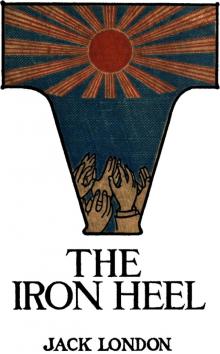 The Iron Heel
The Iron Heel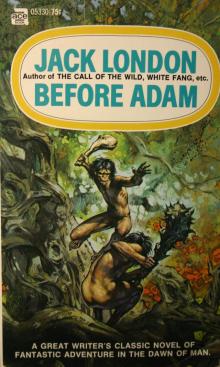 Before Adam
Before Adam Smoke Bellew
Smoke Bellew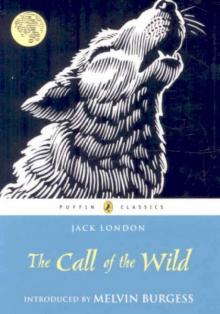 The Call of the Wild
The Call of the Wild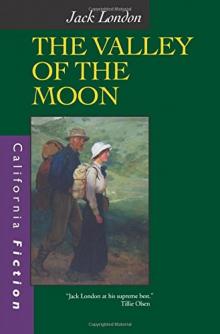 The Valley of the Moon Jack London
The Valley of the Moon Jack London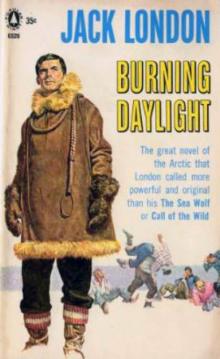 Burning Daylight
Burning Daylight The Sea Wolf
The Sea Wolf White Fang
White Fang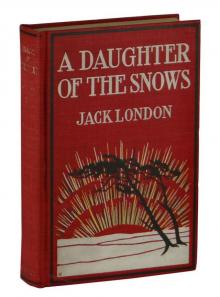 A Daughter of the Snows
A Daughter of the Snows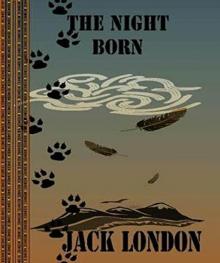 The Night-Born
The Night-Born A Son Of The Sun
A Son Of The Sun Dutch Courage and Other Stories
Dutch Courage and Other Stories The People of the Abyss
The People of the Abyss Michael, Brother of Jerry
Michael, Brother of Jerry Love of Life, and Other Stories
Love of Life, and Other Stories Lost Face
Lost Face The Road
The Road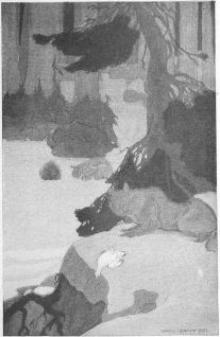 Love of Life
Love of Life The Turtles of Tasman
The Turtles of Tasman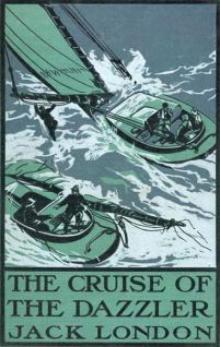 The Cruise of The Dazzler
The Cruise of The Dazzler The Heathen
The Heathen The Scab
The Scab The Faith of Men
The Faith of Men Adventure
Adventure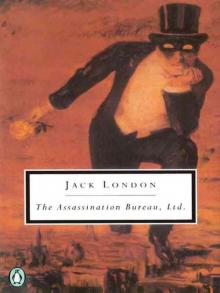 The Assassination Bureau, Ltd.
The Assassination Bureau, Ltd. The Call of the Wild, White Fang, and Other Stories
The Call of the Wild, White Fang, and Other Stories The Call of the Wild and Selected Stories
The Call of the Wild and Selected Stories Jerry of the Islands
Jerry of the Islands Hearts of Three
Hearts of Three The House of Pride
The House of Pride Moon-Face and Other Stories
Moon-Face and Other Stories Children of the Frost
Children of the Frost South Sea Tales
South Sea Tales The Strength of the Strong
The Strength of the Strong The Jacket (The Star-Rover)
The Jacket (The Star-Rover) The Little Lady of the Big House
The Little Lady of the Big House John Barleycorn
John Barleycorn ADaugter of Snows
ADaugter of Snows The Mutiny of the Elsinore
The Mutiny of the Elsinore Northland Stories
Northland Stories Tales of the Fish Patrol
Tales of the Fish Patrol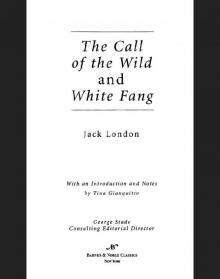 Call of the Wild and White Fang (Barnes & Noble Classics Series)
Call of the Wild and White Fang (Barnes & Noble Classics Series) The Valley of the Moon
The Valley of the Moon The Cruise of the Snark
The Cruise of the Snark The Game
The Game An Autobiography of Jack London
An Autobiography of Jack London